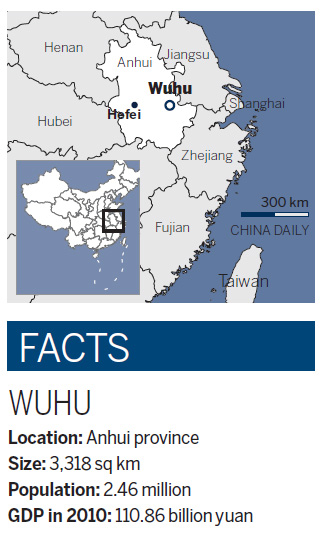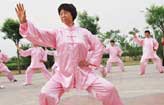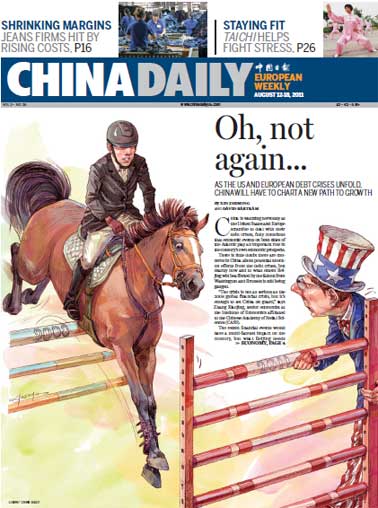Wuhu goes the distance
Updated: 2011-08-05 13:25
(China Daily European Weekly)
Though it will be another six months before Gree starts production in Wuhu, the first phase of its new manufacturing site covers nearly 100 hectares - almost 140 times the size of a football stadium.
 |
But undoubtedly it has been Chery Automobile Co that is the crown jewel of Wuhu's industry. The company, China's largest homegrown car brand, was established in Wuhu more than a decade ago and has several production facilities here. Its units have a combined output capacity of 1 million automotive engines and 900,000 assembled cars.
Founded in 1997 in the economic development area in Wuhu, Chery has also been a major beneficiary of the favorable investment policies in the region, including favorable loan terms from local banks.
Known for its homegrown products as well as a strong research and development base, Chery's biggest competitive advantage has been its excellence in manufacturing small, fuel-efficient vehicles at low costs.
Chery enjoys a 7.5 percent market share in China and is a major exporter after having sold nearly 92,000 cars in overseas markets last year, a 93.2 percent growth over 2009.
The company also recently won a major order in Eastern Europe when it supplied a batch of vehicles to a police station in Belgrade, Serbia.
Chery's success has also bought with it a host of auto parts companies to Wuhu. Investment in Wuhu's automotive and auto parts and accessories industry has soared to nearly 26 billion yuan in the last five years.
Big auto parts makers like Siemens VDO Automotive Co Ltd, Magneti Marelli, a subsidiary of Italian company Fiat Group, US-based PPG Industrial Group, and Continental Group of Germany, have set up units in the Wuhu Economic Development Area (WEDA), close to Chery's facilities.
Most of these units focus mainly on research and development and production of auto engine management systems, auto gauges, auto steering systems and chassis systems.
Johnson Controls, a US-based automotive systems and components manufacturer, set up a unit in Wuhu in 2006 to largely cater to Chery's needs.
Qian Yi, general manager of Johnson Controls Wuhu Automotive Interiors Co, a joint venture between Johnson Controls and Chery, says the company set up its unit in Wuhu to take advantage of the favorable conditions and investor-friendly policies of the local government.
"Wuhu's auto industry has grown so fast thanks to Chery, which is part of the reason why we decided to base our manufacturing facilities here," Qian says.
PPG, the world's largest manufacturer of transportation coatings, opened a 40,000-sq-m plant in Wuhu in 2007 with an investment of more than 700 million yuan.
"One of the reasons why we decided to invest in Wuhu was to offer better support to our key customers and in this case it was Chery," says Viktor Sekmakas, president of PPG Asia Pacific.
"We want to help our customers reduce costs, and by locating our plant closer to the Chery facilities will significantly increase efficiency. In addition, the plant will also help us better support the market in southern China."
Zhang Chunming, deputy director of the administrative committee of WEDA, says that many young people are coming back and scouting for job opportunities in Wuhu.
"It's very important to the local economy if migrants keep returning, because workers with reliable jobs will need homes, thereby giving a boost to the property sector. They will also look for shopping centers and restaurants to spend, which in turn will fuel growth in consumption," Zhang says.
Crowne Plaza, a five-star hotel recently opened in Wuhu, indicating the growing demand from business people. Big international retailers including France's Carrefour and Germany's Metro Group have also expressed interest in opening branches in Wuhu.
By 2015 the GDP of WEDA alone is forecast to hit 70 billion yuan, with an average annual growth of 23 percent. Industrial output value is expected to hit 280 billion yuan with an average annual increase of 24 percent.
Lu Jinyong, professor of economics at the University of International Business and Economics in Beijing, says the inland shift in China is crucial to its economic prospects. "The fast-growing inland development will be the engine that drives economic growth in China amid increasing global economic uncertainties."
Guo Zhicheng, director of the China-Britain Business Council, says that many British companies are considering inland cities for investment over high-cost locations like Shanghai, Beijing and Shenzhen.
Zhang says that for the next five years Wuhu will further strengthen its advantages and evolve techniques to draw more domestic and foreign enterprises to the city. "We still have a long way to go, unlike the coastal regions that had a head start."
E-paper

Going with the flow
White-collar workers find a traditional exercise helps them with the frustrations of city life
The light touch
Long way to go
Outdoor success
Specials

Star journalist remembered
Friends, colleagues attended a memorial service to pay tribute to veteran reporter Li Xing in US.

Robots seen as employer-friendly
Robots are not new to industrial manufacturing. They have been in use since the 1960s.

A prosperous future
Wedding website hopes to lure chinese couples
